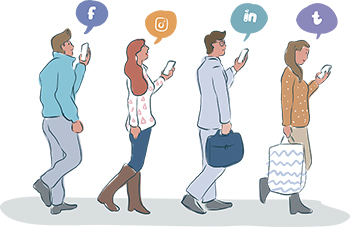Are you sharing your life with over three billion people online? Believe it or not, that’s what most people are doing whenever they use the internet and post something on Facebook, Instagram, Twitter, and other social
Instead of keeping their personal information safe and secure, many individuals choose to brag about their new car, home, job promotion, and other juicy details that don’t belong next to a friend’s cute cat video. This can bring about dire consequences.  Information shared online can be used by hackers to
Information shared online can be used by hackers to
What should people never do on social media? Post without thinking. Period. Before you post something, ask yourself these questions: What information am I putting online? What is in the background of my image? If I wanted revenge on myself ― how would I use this information
To protect yourself from cybercriminals, here are four things you should never
- Believe questionable posts and videos
At first glance, you’ll find that the internet is full of amazing discoveries, talented people, and unique information. Unfortunately, more than half of what’s online isn’t true. There’s a lot of garbage out there that can fool you into giving out your contact details,credit card numbers, and other important information. Don’t be thenext victim.
In today’s digital age, it isn’t hard to create a convincing hoax or fake story. With the right copy and a cool video, you can easily make millions of people believe that a celebrity has died, a dinosaur has been resurrected, there’s a cure for terminal cancer, and Earthis flat.
One video that has over15 million views claims that drilling a hole in youriPhone 7 will uncover a hidden headphone jack. Of course, that’s not true, but the video has fooled a good number of people into destroyingtheir iPhones!
Another hoax said that Facebook changed its privacy policy and all your pictures, posts, and messages will become public. This has angered a lot of people who tried to change their privacy settings until they realized too late that the postwasn’t real.
It may be difficult to separate fact from fiction in social media, but always remember that if something is too good to be true, it probably is! You can also do a quick internet search to checkthe facts. - Use the same password for different sites
In the old days, creating a password was easy. It was usually taken from your birthday, the name of your favorite pet, the numbers1 to 6, or your best friend’s name. While some people still stick to the old ways, putting them at risk, passwords nowadays are a combination of letters, numbers, andspecial characters.
These complex passwords are safe, provided you don’t use the same one at different sites. However, remembering all those unique passwords can be difficult. Try using a reliable password manager. Just save your password once and it’s available on all your devices. That way, you don’t have to memorize all those difficult passwordsyou created. - Not taking advantage of multi-factor authentication
Multi-factor authentication may sound like a mouthful of Greek salad, but it simply means you’ll be asked for ways to prove who you say you are. It’s like presenting forms of identification to access your bank account. By doing so, no one can get hold of your account if someone knowsyour password.
Some sites may require your smartphone number so they can send you additional access codes, or your email address to send you a link to click and confirm your identity. This is being used by many companies, like Microsoft, Google, Facebook, and Apple. Isn’t it about time you didthe same? - Sharing a lot of information
Sharing photos of your new dog or pet hamster is acceptable, but pouring out details of your life is ano-no online. It’s not safe to post close-up pictures of your newdriver’s license or ID that contains your age, date of birth, andhome address.
Neither is it acceptable to show photos of your new house key or the inside of your home. The former can be copied, while the latter can tell burglars how to break intoyour abode.
Employees should also be prohibited from taking selfies at the office since the foreground or background of these pictures may contain sensitive information on whiteboards, computer monitors, or walls. For people who like to brag by posting pictures of their paychecks, they are only inviting criminals torob them!

